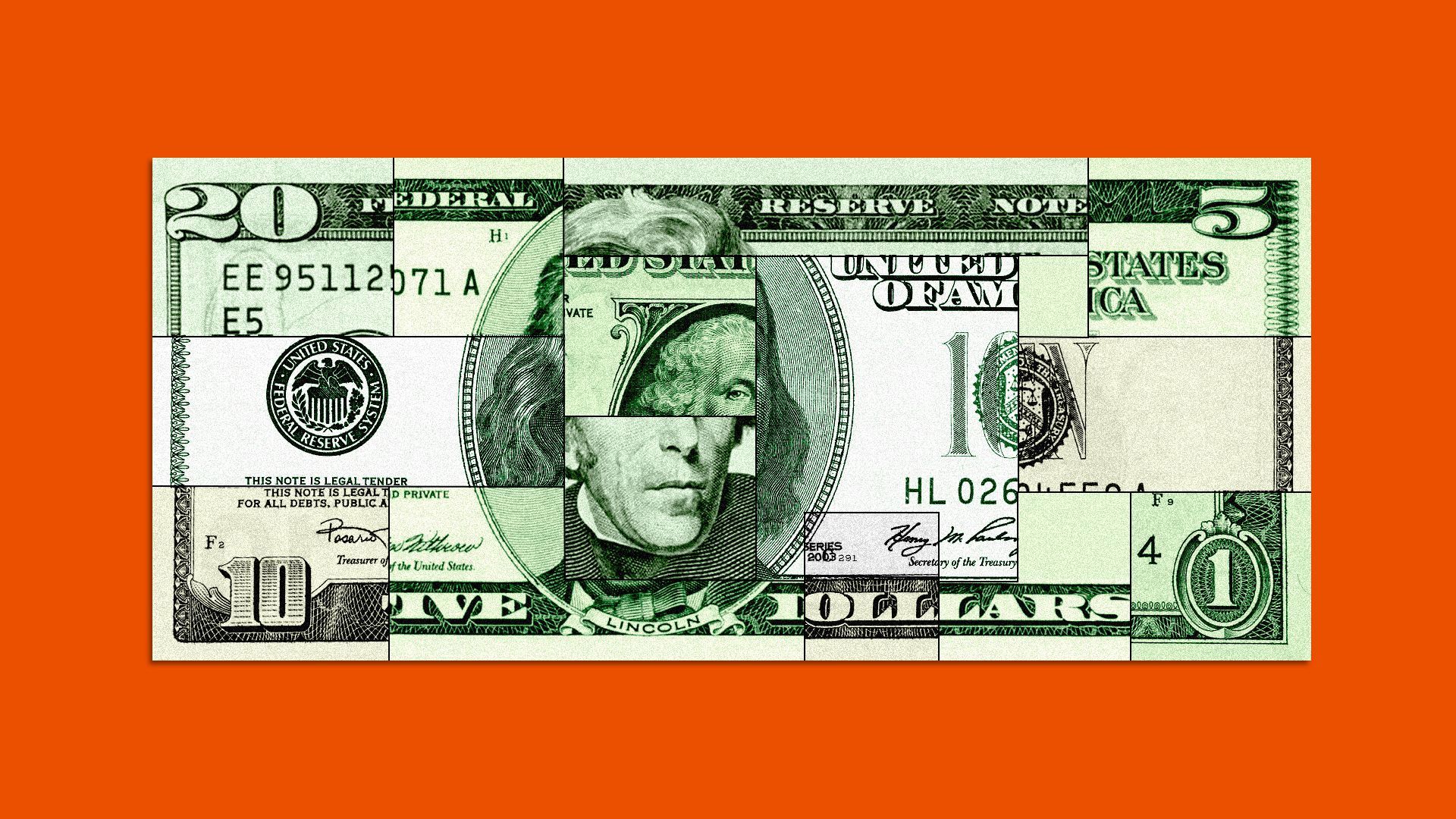| | | | | | | Presented By NetJets | | | | Axios Markets | | By Dion Rabouin ·Apr 12, 2021 | | Good morning! Was this email forwarded to you? Sign up here. (Today's Smart Brevity count: 1,122 words, 4 minutes.) 🚨 Heads up! No more newsletters this week. Markets will be dark the remainder of the week. I'll be back in your inbox a week from today. 🎙 "People confuse fame with validation or love. But fame is not the reward. The reward is getting fulfillment out of doing the thing you love." - See who said it and why it matters at the bottom. | | | | | | 1 big thing: The mismatched economy |  | | | Illustration: Aïda Amer/Axios | | | | As job growth finally starts to take off thanks to improving vaccine numbers and increasing optimism, the economy is confronting an unusual quandary: a mismatch of expectations between workers and employers that's becoming a standoff. Why it matters: The jobs growth bonanza economists and asset managers are predicting for 2021 and beyond could be inhibited by a market where American workers — particularly those at lower income levels — demand higher wages and employers refuse to pay them. What's happening: Even with nearly 10 million fewer Americans employed than before the pandemic hit, more business surveys are showing companies struggling to find workers. Driving the news: Last week's Job Openings and Labor Turnover Survey showed a record 7.4 million job openings in February, the most since January 2019. - However, actual hiring rose to just 5.7 million jobs, which was the lowest total (excluding the pandemic) since May 2019.
- Similarly, 40% of small businesses surveyed in February by the National Federation of Independent Business said they had jobs they couldn't fill — the highest percentage in the history of the data, which dates back to 1974.
- In March 91% of those owners trying to hire reported few or no "qualified" applicants for the positions they were trying to fill, even though a net 28% (seasonally adjusted) of owners reported raising compensation, the highest level in the past 12 months.
What we're hearing: Hiring is breaking down along the lines of the K-shaped recovery, says Joseph Brusuelas, chief economist at tax policy firm RSM. - "While [lower-wage] workers are plentiful, firms are going to find it difficult to recruit workers unless they are willing to pay higher wages," he tells Axios, something large companies especially have shown they are unwilling to do.
- "Thus firms then must choose: Hold down wage costs or substitute technology for labor. Either way, it results in historically low labor force participation rates and employment to population ratio."
Take a look around: The mismatch is already clear in fast-food and restaurant hiring, as my former colleague Hilary Russ wrote for Reuters last week. - "Total nightmare" is the way FAT Brands CEO Andy Wiederhorn described the staffing situation to Russ for franchisees of his company's restaurants like Johnny Rockets and Fatburger.
- "The most recent stimulus check and unemployment benefits have been a catalyst for people to stay at home" instead of looking for work, he added.
The bottom line: Employers will face a dilemma — "Either pay higher wages to recruit workers or prepare to pull forward a decade's worth of productivity enhancing capital expenditures into the near term," Brusuelas says. - "Either way the pre-pandemic status quo ante is not returning."
|     | | | | | | 2. Catch up quick | | Jack Ma's Ant Financial will apply to become a financial holding company overseen by China's central bank after representatives were summoned to a meeting with regulatory agencies. (WSJ) The Business Roundtable will release a survey showing 98% of 178 CEOs polled say increasing the corporate tax rate to 28% will have a negative impact. (Axios) Fed chair Jerome Powell told "60 Minutes" Sunday that the U.S. economy is at an "inflection point," with potential for strong growth but facing risks of another COVID-19 surge and cyberattacks. (CBS News) Microsoft is in advanced talks to acquire AI and speech technology company Nuance Communications in a deal valued at around $16 billion. (Bloomberg) |     | | | | | | 3. More inflows to stocks in 2021 than the past 12 years combined |  Data: Bank of America; Chart: Axios Visuals Money flowing to stocks globally in just the past five months ($576 billion) has exceeded the inflow seen over the prior 12 years by well over $100 billion, according to data from Bank of America Global Research. Why it matters: It's further evidence that the sea change in investor psychology continues and has grown to a profound new level. How we got here: Money had consistently flowed out of equity funds as investors sought safety in bonds and money market funds even as stock indexes raced to record highs. - BofA's data show that since 2008 $2.4 trillion has flowed into bonds while just $1 trillion has gone into equities, about half of which has come just this year.
- Record sums of cash have flown into equity funds this year with the No. 1 and No. 2 largest inflows to stock funds ever both occurring since the start of February.
Don't sleep: Investors also are loading up with record leverage, borrowing money against their portfolio holdings at the highest rate since 2007, according to Financial Industry Regulatory Authority data. |     | | | | | | A message from NetJets | | Multiple ways to fly with NetJets | | |  | | | | The NetJets Card Program™ offers all-inclusive pricing and guaranteed access to the largest fleet in private aviation. Choose from multiple jet card options with the ultimate convenience of NetJets. Discover ways to fly with all-inclusive pricing. | | | | | | 4. Freight traffic posted biggest annual gain ever in March |  Data: Association of American Railroads; Table: Axios Visuals Freight train traffic, an important gauge of U.S. economic health, showed a major pickup in March, increasing year over year for the first time since January 2019, data from the Association of American Railroads (AAR) showed. What happened: Intermodal train traffic — a measure of shipping containers and truck trailers moved on rail cars — jumped 24% last month. - "That's the biggest monthly gain ever for intermodal; it includes a 28% increase in the last two weeks of March," AAR noted in its latest Rail Time Indicators report.
- "March's intermodal gains are not solely a function of easy comparisons, though: March 2021 was the highest-volume March ever for intermodal and the sixth-best intermodal month overall."
Details: Thanks to big gains last month, overall intermodal train traffic is up 13.2% from 2020's levels, and ahead of intermodal traffic through March in 2019 and 2018. |     | | | | | | 5. The dispiriting housing boom |  Data: National Association of Realtors; Chart: Axios Visuals Axios Capital author Felix Salmon writes: It's a discouraging scene: Bidding wars, soaring prices, and fears that homeownership is becoming out of reach for millions of Americans. We're in a housing frenzy, driven by a massive shortage of inventory — and no one seems to be happy about it. Why it matters: Not all bubbles burst. Real estate, in particular, tends to rise in value much more easily than it falls. Besides, says National Association of Realtors chief economist Lawrence Yun, this "is not a bubble. It is simply lack of supply." By the numbers: America has a record-low number of homes available for sale — just 1.03 million, according to the latest NAR data. That compares to a peak of more than 4 million at the height of the last housing bubble, in July 2007. - The total number of active listings this week is down a record 54% from the same week a year ago, per Realtor.com. That in turn has helped to drive national prices up 17.2% over last year.
- Almost half of homes now sell within one week of being listed, per Redfin.
- In Austin, Texas, the median listing price has risen 40% in one year to $520,000.
The big picture: Prices are being driven up by a combination of factors, including continued low mortgage rates, a pandemic-era construction slowdown, a desire for more space as people work increasingly from home, and a stock market-driven increase in money available for a downpayment. - A rise in financial buyers — large corporations buying up homes to rent them out — is only making the market tighter, and decreasing the number of owner-occupied properties available.
- What's missing: Unlike the mid-2000s, this time around there's no exuberant culture of condo flipping. While interest rates are low, lending standards are still tight, making it hard to buy a house you can't afford.
Read more. |     | | | | | | A message from NetJets | | NetJets' most popular aircraft model | | |  | | | | NetJets' Cessna® Citation Latitude® is designed with your optimum comfort in mind. A new opportunity: This midsize favorite has a generous amount of cabin space and is now available through the NetJets Card Program™. Explore the world's finest fleet. | | | | Thanks for reading! Quote: "People confuse fame with validation or love. But fame is not the reward. The reward is getting fulfillment out of doing the thing you love." Why it matters: On April 12, 1979, actress Claire Danes, aka Angela Chase aka Carrie Mathison, was born. - The star of "My So-Called Life" and "Homeland" among others has been the recipient of three Primetime Emmy Awards, four Golden Globes and two Screen Actors Guild Awards.
This newsletter is written in Smart Brevity®. Learn how your team can communicate in the same smart, clear style with Axios HQ. | | | | Axios thanks our partners for supporting our newsletters.
Sponsorship has no influence on editorial content. Axios, 3100 Clarendon Blvd, Suite 1300, Arlington VA 22201 | | | You received this email because you signed up for newsletters from Axios.
Change your preferences or unsubscribe here. | | | Was this email forwarded to you?
Sign up now to get Axios in your inbox. | | | | Follow Axios on social media:    | | | | | |








No comments:
Post a Comment